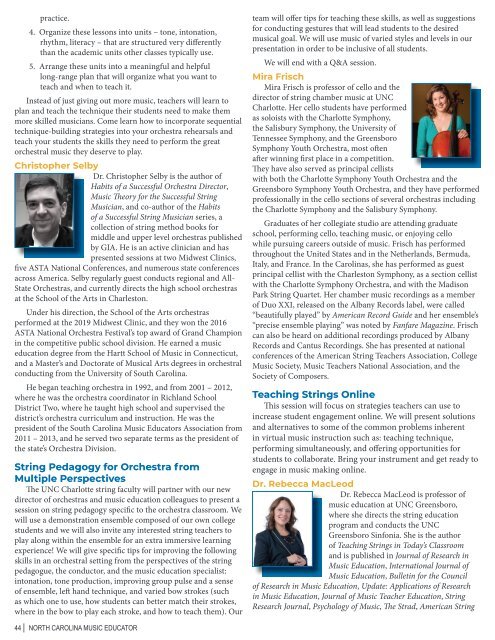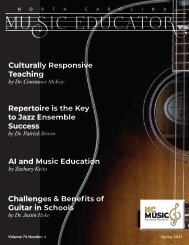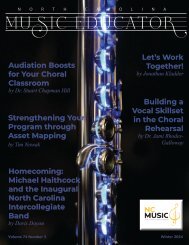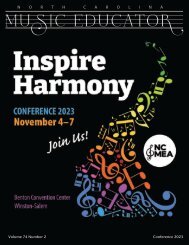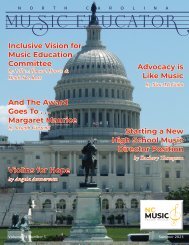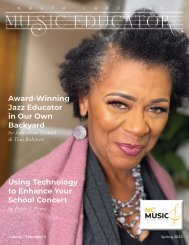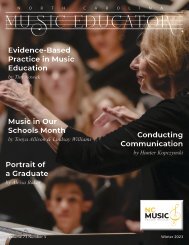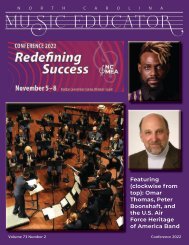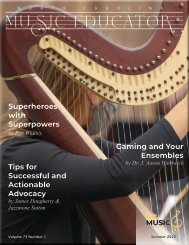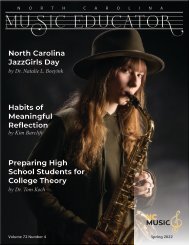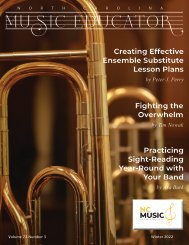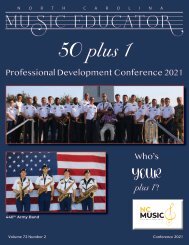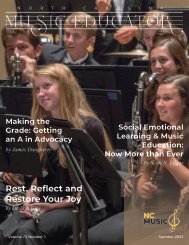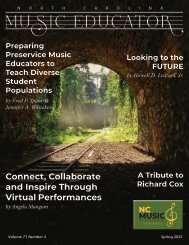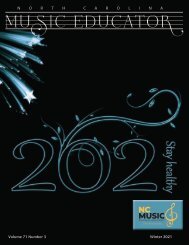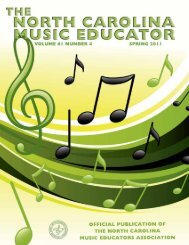NC Music Educator Conference 2020
Professional journal for NCMEA Conference 2020
Professional journal for NCMEA Conference 2020
- TAGS
- ncmea
Create successful ePaper yourself
Turn your PDF publications into a flip-book with our unique Google optimized e-Paper software.
practice.<br />
4. Organize these lessons into units – tone, intonation,<br />
rhythm, literacy – that are structured very differently<br />
than the academic units other classes typically use.<br />
5. Arrange these units into a meaningful and helpful<br />
long-range plan that will organize what you want to<br />
teach and when to teach it.<br />
Instead of just giving out more music, teachers will learn to<br />
plan and teach the technique their students need to make them<br />
more skilled musicians. Come learn how to incorporate sequential<br />
technique-building strategies into your orchestra rehearsals and<br />
teach your students the skills they need to perform the great<br />
orchestral music they deserve to play.<br />
Christopher Selby<br />
Dr. Christopher Selby is the author of<br />
Habits of a Successful Orchestra Director,<br />
<strong>Music</strong> Theory for the Successful String<br />
<strong>Music</strong>ian, and co-author of the Habits<br />
of a Successful String <strong>Music</strong>ian series, a<br />
collection of string method books for<br />
middle and upper level orchestras published<br />
by GIA. He is an active clinician and has<br />
presented sessions at two Midwest Clinics,<br />
five ASTA National <strong>Conference</strong>s, and numerous state conferences<br />
across America. Selby regularly guest conducts regional and All-<br />
State Orchestras, and currently directs the high school orchestras<br />
at the School of the Arts in Charleston.<br />
Under his direction, the School of the Arts orchestras<br />
performed at the 2019 Midwest Clinic, and they won the 2016<br />
ASTA National Orchestra Festival’s top award of Grand Champion<br />
in the competitive public school division. He earned a music<br />
education degree from the Hartt School of <strong>Music</strong> in Connecticut,<br />
and a Master’s and Doctorate of <strong>Music</strong>al Arts degrees in orchestral<br />
conducting from the University of South Carolina.<br />
He began teaching orchestra in 1992, and from 2001 – 2012,<br />
where he was the orchestra coordinator in Richland School<br />
District Two, where he taught high school and supervised the<br />
district’s orchestra curriculum and instruction. He was the<br />
president of the South Carolina <strong>Music</strong> <strong>Educator</strong>s Association from<br />
2011 – 2013, and he served two separate terms as the president of<br />
the state’s Orchestra Division.<br />
String Pedagogy for Orchestra from<br />
Multiple Perspectives<br />
The U<strong>NC</strong> Charlotte string faculty will partner with our new<br />
director of orchestras and music education colleagues to present a<br />
session on string pedagogy specific to the orchestra classroom. We<br />
will use a demonstration ensemble composed of our own college<br />
students and we will also invite any interested string teachers to<br />
play along within the ensemble for an extra immersive learning<br />
experience! We will give specific tips for improving the following<br />
skills in an orchestral setting from the perspectives of the string<br />
pedagogue, the conductor, and the music education specialist:<br />
intonation, tone production, improving group pulse and a sense<br />
of ensemble, left hand technique, and varied bow strokes (such<br />
as which one to use, how students can better match their strokes,<br />
where in the bow to play each stroke, and how to teach them). Our<br />
team will offer tips for teaching these skills, as well as suggestions<br />
for conducting gestures that will lead students to the desired<br />
musical goal. We will use music of varied styles and levels in our<br />
presentation in order to be inclusive of all students.<br />
We will end with a Q&A session.<br />
Mira Frisch<br />
Mira Frisch is professor of cello and the<br />
director of string chamber music at U<strong>NC</strong><br />
Charlotte. Her cello students have performed<br />
as soloists with the Charlotte Symphony,<br />
the Salisbury Symphony, the University of<br />
Tennessee Symphony, and the Greensboro<br />
Symphony Youth Orchestra, most often<br />
after winning first place in a competition.<br />
They have also served as principal cellists<br />
with both the Charlotte Symphony Youth Orchestra and the<br />
Greensboro Symphony Youth Orchestra, and they have performed<br />
professionally in the cello sections of several orchestras including<br />
the Charlotte Symphony and the Salisbury Symphony.<br />
Graduates of her collegiate studio are attending graduate<br />
school, performing cello, teaching music, or enjoying cello<br />
while pursuing careers outside of music. Frisch has performed<br />
throughout the United States and in the Netherlands, Bermuda,<br />
Italy, and France. In the Carolinas, she has performed as guest<br />
principal cellist with the Charleston Symphony, as a section cellist<br />
with the Charlotte Symphony Orchestra, and with the Madison<br />
Park String Quartet. Her chamber music recordings as a member<br />
of Duo XXI, released on the Albany Records label, were called<br />
“beautifully played” by American Record Guide and her ensemble’s<br />
“precise ensemble playing” was noted by Fanfare Magazine. Frisch<br />
can also be heard on additional recordings produced by Albany<br />
Records and Cantus Recordings. She has presented at national<br />
conferences of the American String Teachers Association, College<br />
<strong>Music</strong> Society, <strong>Music</strong> Teachers National Association, and the<br />
Society of Composers.<br />
Teaching Strings Online<br />
This session will focus on strategies teachers can use to<br />
increase student engagement online. We will present solutions<br />
and alternatives to some of the common problems inherent<br />
in virtual music instruction such as: teaching technique,<br />
performing simultaneously, and offering opportunities for<br />
students to collaborate. Bring your instrument and get ready to<br />
engage in music making online.<br />
Dr. Rebecca MacLeod<br />
Dr. Rebecca MacLeod is professor of<br />
music education at U<strong>NC</strong> Greensboro,<br />
where she directs the string education<br />
program and conducts the U<strong>NC</strong><br />
Greensboro Sinfonia. She is the author<br />
of Teaching Strings in Today’s Classroom<br />
and is published in Journal of Research in<br />
<strong>Music</strong> Education, International Journal of<br />
<strong>Music</strong> Education, Bulletin for the Council<br />
of Research in <strong>Music</strong> Education, Update: Applications of Research<br />
in <strong>Music</strong> Education, Journal of <strong>Music</strong> Teacher Education, String<br />
Research Journal, Psychology of <strong>Music</strong>, The Strad, American String<br />
“At U<strong>NC</strong>SA, my professors believe in<br />
me and push me harder than anyone<br />
before. They let me prove to myself<br />
that I can be the artist I want to be.”<br />
— Brianna Cantwell, ’23<br />
Dance<br />
Design & Production<br />
Drama<br />
Filmmaking<br />
<strong>Music</strong><br />
Powering<br />
Creativity<br />
<strong>Music</strong><br />
44 | NORTH CAROLINA MUSIC EDUCATOR NORTH CAROLINA U<strong>NC</strong>SA.EDU/MUSIC<br />
EDUCATOR | 45


